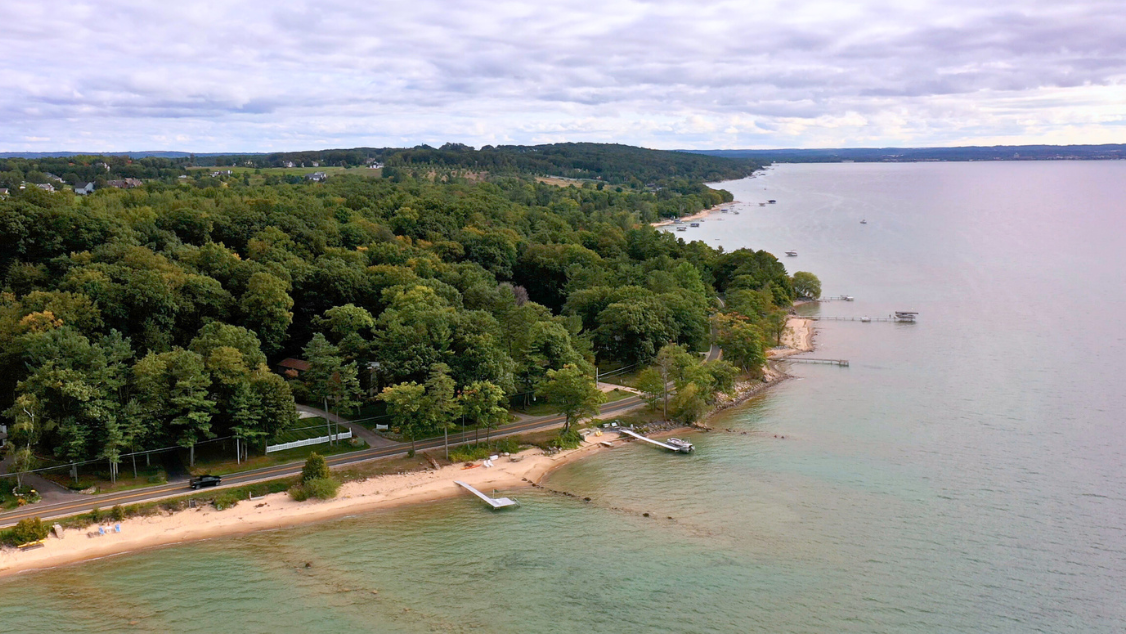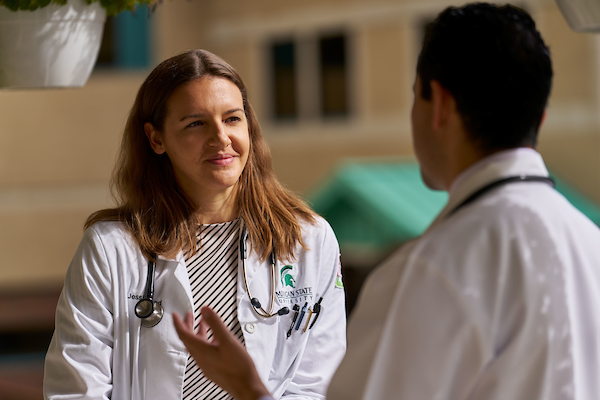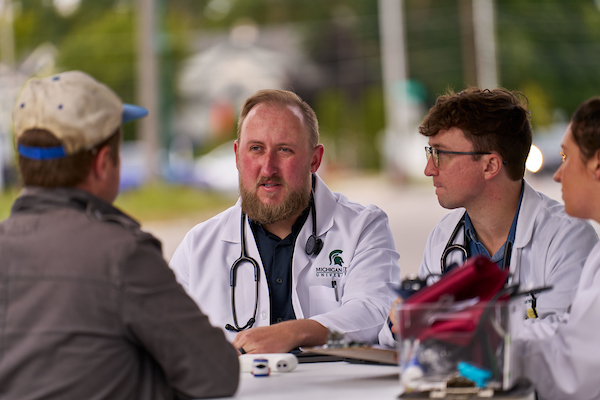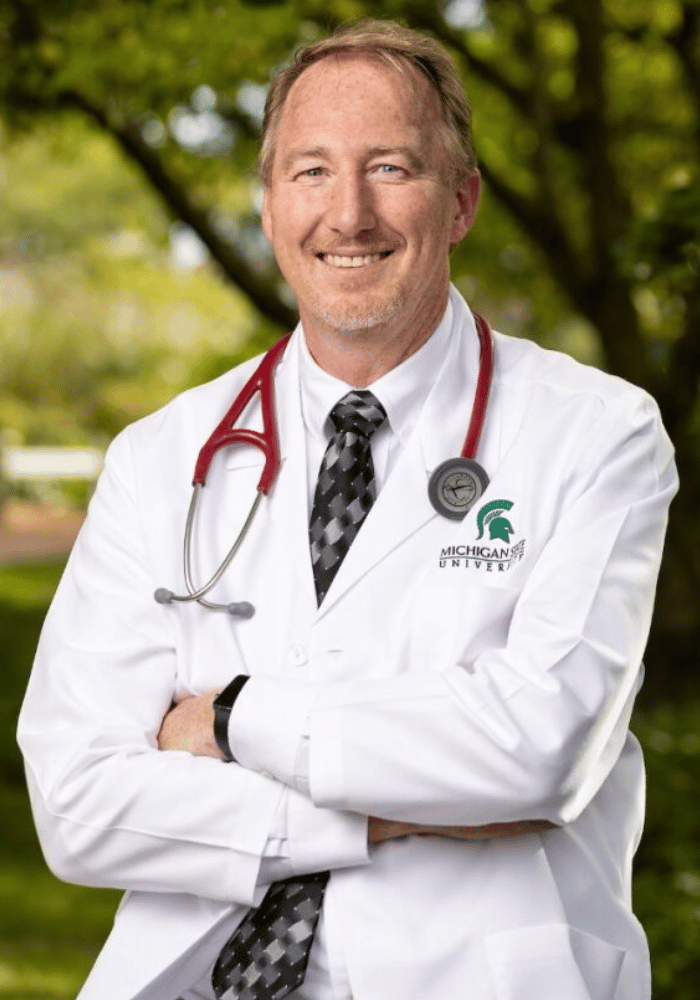Traverse City rural health students embedded in community to serve patients
July 25, 2024
 While few physicians make house calls these days, College of Human Medicine students in Traverse City take the old practice to an extreme. They see patients on the streets, in the missions, even in a rural encampment.
While few physicians make house calls these days, College of Human Medicine students in Traverse City take the old practice to an extreme. They see patients on the streets, in the missions, even in a rural encampment.
“Our whole mantra is going to the people,” said David Klee, MD, community assistant dean for the College of Human Medicine’s Traverse City Campus. “We go to them. We see them tent side.”
After completing their first two years in East Lansing or Grand Rapids, the third- and fourth-year students in the college’s Rural Community Health Program spend much of their time in the Northern Michigan hospitals operated by Munson Healthcare, MyMichigan-Alpena and Corewell Health-Ludington.
“And then you combine that with the opportunity to work in more-rural settings,” Klee said, “so they get a lot of firsthand experience. When you’re working in a small community and you have a trauma case come in, you have to be able to respond. Our students are right up at the table, rolling their sleeves up, and practicing medicine.” With fewer resources close at hand, they learn to be innovative. The students, assigned to some 100 physician offices and clinics in small towns from Ludington north to the Mackinac Bridge, are trained in such skills as using portable ultrasound machines. They collaborate on projects with pharmacy, nursing, and other health care students. And each is assigned to identify a health need in a community and develop a project to address it.
With fewer resources close at hand, they learn to be innovative. The students, assigned to some 100 physician offices and clinics in small towns from Ludington north to the Mackinac Bridge, are trained in such skills as using portable ultrasound machines. They collaborate on projects with pharmacy, nursing, and other health care students. And each is assigned to identify a health need in a community and develop a project to address it.
They work closely with nearly 500 physicians who volunteer to teach the next generation of doctors without compensation, other than the satisfaction of giving back.
“It’s that old-fashioned value of someone helped them when they were students,” said Nicki Brown, assistant director for student programs at the Traverse City Campus, “so they’re going to help someone else.”
As part of its broader Leadership in Rural Medicine Program, the college created the Rural Community Health Program to serve patients in the small towns and countryside, many of them underserved and disadvantaged. That includes some of society’s most marginalized and often invisible residents. Three years ago, the college, in partnership with Munson Healthcare, the Traverse City Clinic, and Goodwill, founded a Street Medicine program, taking medical students to the streets and rural encampments where many of the area’s unhoused live. “For our students, it’s a great opportunity to see the social determinants of health in action,” Klee said. They treat patients suffering chronic illnesses, infections, injuries, respiratory problems, and substance abuse.
“For our students, it’s a great opportunity to see the social determinants of health in action,” Klee said. They treat patients suffering chronic illnesses, infections, injuries, respiratory problems, and substance abuse.
In May (2024), the American Hospital Association honored the Street Medicine program with its Dick Davidson Nova Award, created to celebrate the collaboration of hospitals and organizations to improve the health of individuals and communities.
While the program undoubtedly has saved lives, some in an area encampment died, “so there is still much work to be done,” Klee said.
Eleven students are graduating from the Traverse City Rural Medicine Program in 2024 and will go into residency programs to study family medicine, emergency medicine, internal medicine, obstetrics, orthopedics, pediatrics, and other specialties needed in rural areas. The college is starting a program to interest northern Michigan high school students in medical careers, said Christy Lavene, director of student programs and coordinator for the Rural Community Health Program in Traverse City. The hope is that many who become doctors will return to the small towns and rural areas of northern Michigan. About 20 percent of past graduates of the Traverse City Rural Medicine Program practice medicine in the northern Lower Peninsula, Lavene said.
The college is starting a program to interest northern Michigan high school students in medical careers, said Christy Lavene, director of student programs and coordinator for the Rural Community Health Program in Traverse City. The hope is that many who become doctors will return to the small towns and rural areas of northern Michigan. About 20 percent of past graduates of the Traverse City Rural Medicine Program practice medicine in the northern Lower Peninsula, Lavene said.
“We know that people who grow up in a rural community are more apt to return to a rural community,” Klee said. The small communities “really embrace our students,” he added. “They know them not just as students, but as members of the community.”

